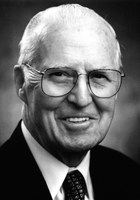Borlaug was one of the world's foremost agricultural scientists. He has been acknowledged as the father of the green revolution, which over the past half century has helped to save hundreds of millions of lives in poor countries. The breakthroughs in agriculture science he ushered in also helped to set the stage for the impressive economic gains that have taken place in Asia and South America.
Borlaug was born in 1914 in Iowa in the American heartland. He received his doctorate degree in plant pathology from the University of Minnesota in 1941 and worked for a brief time with both the US Forest Service and the corporate chemical giant DuPont. In the mid 1940s, under an initiative funded by the Ford and Rockefeller foundations, he refocused his career to concentrate his research on improving crop yields in the developing world.
For the past 30 years, he worked as a professor and researcher, first at Cornell University and then at Texas A&M University in the United States, where he had served as a distinguished professor of international agriculture for a quarter century. In the 1960s, he headed the Maize and Wheat Improvement Centre (CIMMYT) in Mexico, one of the premier research centres established under the Consultative Group on International Agriculture (CGIAR). At CIMMYT, he gained international fame for his efforts to improve wheat production. Through his long and storied career, he also served as an agricultural consultant with governments throughout the developing world.
At the time he began his research career, hunger haunted large portions of the world. Projections of rapid population among hard-pressed countries suggested that critical food security problems, marked by the spectre of hunger and malnutrition, would only get worse. As the famed biologist Paul R. Ehrlich wrote in his 1968 bestseller The Population Bomb, "The battle to feed all of humanity is over... hundreds of millions of people will starve to death in spite of any crash programs embarked upon now."
Under a global agricultural initiative supported largely by the Ford and Rockefeller foundations that began in the post World War period, Borlaug was able to apply his research skills to help produce the first semi-dwarf, disease-resistant wheat varieties that could withstand difficult growing conditions to produce high yields. The results of his research were clear for the world to see. In 1963, Mexico became an exporter of wheat as yields increased six-fold compared to 20 years earlier.
Borlaug subsequently applied the same techniques to Asia, achieving similar results. Between 1965 and 1970, food production more than doubled in India and Pakistan. As a result, Pakistan became self-sufficient in wheat production in 1968 and India in 1974.
Borlaug's work not only addressed one of the most critical moral issues of the 20th century – widespread hunger and malnutrition – but also set the stage for the Asian economic miracle of the late 1990s, which was founded on the continent's ability to feed its citizens largely through the cultivation of wheat and rice varieties developed by Borlaug and his colleagues. In the 1980s and 1990s, Borlaug, who remained active well into his nineties, sought to apply the knowledge and know-how that had proven so successful in Asia and South America to Africa, under the Sasakawa African Association.
In addition to the Nobel Prize for Peace, Borlaug was a recipient of the Presidential Medal of Freedom and the Congressional Gold Medal, the two highest civilian honours awarded by the US government. He also received nearly 50 honorary degrees from universities across the globe and was a member of 25 science academies and associations worldwide.
Ed Runge, retired head of Texas A&M University's Department of Soil and Crop Science, has summarized the life and work of Norman Borlaug in this simple and elegant way: "He made the world a better place."


